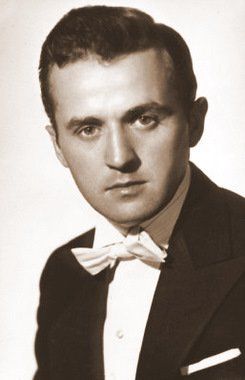Jerzy Dobrzyński
Jerzy Dobrzyński was born on 1 March 1936 in Warsaw (Poland). He studied accordion under Eugeniusz Lassota, organ under Tadeusz Jarzecki and conducting under Bogdan Chodyna at the Fryderyk Chopin University of Music in his hometown. He completed his conducting studies under Stanislaw Wislocki and in Rome at the Accademia Nazionale di Santa Cecilia under Franco Ferrara. Already in his last student year Jerzy Dobrzyński was invited by the director Teodor Zalewski to take the position of lecturer for conducting - a unique act in the history of the University. 28 conductors in total received their conducting diplomas through Jerzy Dobrzyński while in this position. Beside that he was also assistant conductor of the National Polish Army Orchestra under its prinicipal conductor Arnold Rezler.
After his student years Jerzy Dobrzyński became the principal conductor of the State Folk Group of Song and Dance "Mazowsze". He later became conductor of the choir of the Polish National Philharmonic, the Chamber Orchestra of the Warsaw Music Society, the Chamber Orchestra of the Wloclawek Music Society as well as artistic director of the Warsaw Singing Society "Lutnia". In 1985 Jerzy Dobrzyński emigrated to the USA and worked at the Talent Education Research Institute (as part of the Suzuki method) and conductor of the International Music Theatre both in Chicago until his retirement in 2001.
For his lifetime achievements Jerzy Dobrzynski was awarded the Polish Golden Cross of Merit, the Silver Medal of Merit of the Wloclawek Voivodeship, the Polish Bronze Medal of Merit for National Defence and the title "Outstanding citizen of the United States" awarded by the Chicago City Council.
In my possession is an autograph manuscript of the song "Dziewicze brzozy" for voice and piano by Jerzy Dobrzynski. The words are on the poem "Dziewicze brzozy" (Pristine birches) by Leopold Staff. The manuscript was found in the estate of the famous Polish mezzosoprano Wanda Werminska, but bears a dedication to a Helena Antonszewska.
Jerzy Dobrzynski focused early on his conducting career and so composed only this song and 12 fugues for organ. But the score of the 12 fugues is lost and so this song is the only available composition.
The estate of Wanda Werminska contained also a few other manuscripts by Polish composers. All these compositions are songs for voice and piano, but I was not able to find biographical information to any of the mentioned composers. Two of the manuscripts are dated, one in 1952, the other in 1953. In these years Wanda Werminska gave her last performances at the Warsaw Opera house before retiring from concert stage. So there is a good chance that all works - also the Dobrzynski above - date from around 1950.
Here are the other works and composers:
- Michał Baczyński: Czemużeś mi matulu (1952), with dedication to Wanda Werminska
- Jan Mańkowski: Senne marzenia (1953)
- Zygmunt Janusz: Ścieżka & Późne Bzy
If you know more about these composers and their works, please let me know via the contact page here.
